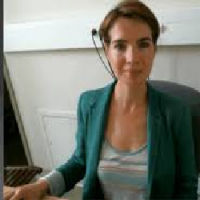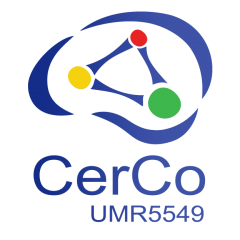
Equipe AA+
chloe.farrer@cnrs.fr
Tél : 05 62 74 61 25
I am a cognitive neuroscientist at the Brain and Cognition Research Centre in Toulouse and a research associate of the Institute for Advanced Study of Toulouse. I obtained my PhD from the University of Lyon under the supervision of Marc Jeannerod. During my PhD I also conducted some research with Chris Frith at the University College of London. I then did a Post-Doc at Dartmouth College in the United States with Scott Grafton. I was recruited at the CNRS in 2004.
RESEARCH
My research focuses on two themes : the cognitive and neural basis of voluntary action and the evaluation of early interventions for promoting children’s executive functions. I use psychophysics as well as brain imaging techniques (EEG and fMRI).
• Early intervention on children’s executive functions : a neurocognitive and socioeconomic perspective
We have recently conducted a project on the evaluation of a preschool intervention to promote executive functions (a set of cognitive processes involved in the voluntary control of our actions, thoughts and emotions) in French pre-schoolers. Executive functions underlie the ability to self-regulate, which is important in many aspects of children’s lives and development. For example, self-regulation is strongly predictive of school achievement as well as of children’s socioemotional competence. Given the pervasive influence of executive functioning there is an increasing interest in developing interventions to promote children’s executive functions as a means of improving school and social adjustment outcomes.
We have adapted the social pretend play activities of an early childhood school curriculum, Tools of the Mind (https://toolsofthemind.org) developed by Elena Bodrova and Deborah Leong that was associated with beneficial effects on children’ s executive functions and social skills.
We implemented these play activities in French kindergarten classrooms and evaluated them using a randomised trial-based approach.
We asked two questions :
⦁ whether and how the intervention affects the development of the brain system supporting executive functioning.
⦁ whether this intervention can help children better regulate their behaviour and better learn.
To do so we collected, prior and after the intervention, some cognitive and brain measures (EEG) of executive functioning as well as academic measures and behavioural measures of self-regulation and socioemotional competence. We are currently analysing the data.
This intervention was registered in socialscienceregistry.org
• Voluntary action
Other research interests are centred on the cognitive and cerebral processes of voluntary action. This research addresses questions like :
⦁ how do we consciously feel that we voluntary control our actions and their effects (a feeling termed the sense of agency),
⦁ how do we infer others’ intentions based on the observation of their voluntary action,
⦁ and how do we voluntarily control our actions.
My research also involves understanding how these processes are impaired in Schizophrenia and Autism and how they are linked to clinical symptoms.
The sense of agency
A first line of work on how the sense of agency emerges has confirmed the role of some motor control processes in the sense of agency and has revealed the implication of the brain’s inferior parietal lobule in this conscious experience.
Another line of research questions the role of the sense of agency in our social interactions. We showed that the sense of agency modulates our moral emotions like empathy. When our actions have painful consequences for another person, our sense of agency over these effects enhances our empathic response to that person’s pain. We proposed that this effect might help regulating our moral behaviour.
Some references
⦁ Lepron E, Causse M, Farrer C. 2014. Responsibility and the sense of agency enhance empathy for pain. Proc Biol Sci. ;282(1799):20142288.
⦁ Farrer C, Valentin G, Hupé JM. 2013. ⦁ The time windows of the sense of agency. Conscious Cogn. ;22(4):1431-41
⦁ Farrer C, Frey SH, Van Horn JD, Tunik E, Turk D, Inati S, Grafton ST. 2008. ⦁ The Angular Gyrus Computes Action Awareness Representations. Cereb Cortex,18(2):254-61.
⦁ Farrer C., Franck N., Georgieff N., Frith C.D., Decéty J., d’Amato T. & Jeannerod M. 2004. ⦁ The neural correlates of agency in schizophrenic patients. Psychiatry Research Neuroimaging, 131(1):31-44.
⦁ Farrer, C. & Frith, CD. 2002. ⦁ Experiencing oneself vs another person as being the cause of an ⦁ action :⦁ The neural correlates of the experience of agency. Neuroimage, 15 : 596-603.
Understanding other’s actions using Bayesian formalism
The use of Bayesian formalism helped better characterising the integration of prior and sensory information in inferring others’ intentions as well as the brain basis of this integration. We also showed that reliance on prior information depends on the amount of sensory information as well as the type of intention inferred, with a greater contribution of prior information for inferring social intentions. Finally, we showed that an under-reliance on prior information explains difficulties in inferring social intentions in patients with Schizophrenia and Autism.
Some references
⦁ Chambon V, Domenech P, Jacquet P, Barbalat G, Bouton S, Pacherie E, Koechlin E and Farrer C. 2017. ⦁ Neural coding of prior expectations in hierarchical intention inference. Scientific reports, Apr 28 ;7(1):1278.
⦁ Chambon V. Farrer C , Pacherie E, Leboyer M, Zalla, T.2017. ⦁ Reduced sensitivity to social priors during action prediction in adults with autism spectrum disorders Cognition, Mar ;160:17-26.
⦁ Chambon V, Pacherie E, Barbalat G, Jacquet P, Franck N, Farrer C. 2011. Mentalizing under influence : abnormal dependence on prior expectations in patients with schizophrenia. Brain ; 134(Pt 12):3728-41.
⦁ Chambon V, Domenech P, Pacherie E, Koechlin E, Baraduc P, Farrer C. 2011. ⦁ What are they up ⦁ to ?⦁ The role of sensory evidence and prior knowledge in action understanding. PLoS One ;6(2):e17133.
Cognitive control of action in Schizophrenia
Using the hierarchical model of cognitive control by Koechlin et al. (2003), we showed that cognitive control deficits in patients with Schizophrenia is not generalised but specifically concerned episodic and contextual cognitive controls.
Some references
⦁ Barbalat, G, Chambon V, Franck N, Koechlin E & Farrer C. 2009. ⦁ The organization of cognitive control within the lateral prefrontal cortex in schizophrenia. Archives of General Psychiatry, 66(4):377-86.
⦁ Chambon, V, Koechlin, E., Franck, Fakra, E, Ciuperca, G, Azorian, JM & Farrer, C. 2008. ⦁ The Architecture of Cognitive Control in Schizophrenia. Brain, 131(Pt 4):962-70.
(complete publications list here)
TEACHING
⦁ Sense of agency : Master Neurosciences Toulouse & Master Neurosciences Lyon
⦁ Development of executive functions : National DUI Pediatric Neurology
⦁ Neuroeducation : with Jean-François Camps (for staff of the French national education system)
⦁ Neurodevelopmental disorders : with Caroline Karsenty, Master BioSanté, Toulouse
COLLABORATORS
Sylvain Chabé-Ferret, Nina Hestermann
Valerian Chambon, Etienne Koechlin, Elisabeth Pacherie, Tiziana Zalla
Agnès Blaye
PERSONAL LINK
Exotic pictures from around the world : Pierre’s Photo Gallery :
http://pierre.pujol.pagesperso-orange.fr
